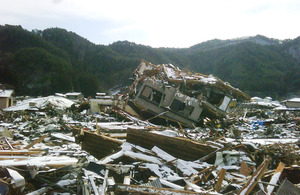DFID Research: PhD Studentship on the impact of Evidence Aid
A new PhD studentship, at Queen's University Belfast, looks at the effects of Evidence Aid on decision-making in public health disaster situations.

A house turned completely upside down by the force of the tsunami, in part of Kamaishi's Unosumia suburb. Picture: Ed Hawkesworth/Department for International Development
The Evidence Aid project was established by the Cochrane Collaboration, following the 2004 Tsunami in the Indian Ocean. It was designed to provide up-to-date evidence, taken from Cochrane Reviews and other systematic reviews, on appropriate interventions in natural disasters and health care emergencies.
Evidence Aid aims to identify and highlight those interventions which work and those which may have harmful outcomes. The website is specifically designed for agencies and people planning for, or responding to, disasters.
The Evidence Aid project has three main elements:
-
Urgent response to evidence needs that arise during and in the short-term after the event.
-
Context specific resources for evidence needs that arise during the subsequent weeks and months. These collections are also useful as part of the planning for disaster risk reduction.
-
Gathering information about the need for evidence and providing up-to-date systematic reviews of relevant research.
This PhD studentship, funded by the UKCRC Centre of Excellence for Public Health, Northern Ireland, is a unique opportunity to work with Evidence Aid, to both influence its work and assess its impact. It will include opportunities to be at the forefront of “leapfrogging” new technological solutions that provide resource-poor settings with direct access to relevant knowledge.
The project will be based around the global focal point for Evidence Aid within Queen’s University Belfast, but will involve substantial international collaboration with those working directly in the disaster and humanitarian sectors. The research will include a process evaluation of the creation of the evidence base and its use, observational epidemiology using outcome data gathered in the aftermath of disasters and analysis of usability and understanding of different types of summary for the findings of research.
Natural disasters and other humanitarian emergencies continue to place an enormous strain on public health. This studentship allows for further research into how evidence can be evaluated and delivered to the people who need it, when they need it.
Applications should be submitted before Friday 31st May 2013. To apply online visit the Queen’s on-line application portal and for further guidance please visit the University’s Prospective Student pages.
The Department for International Development works with the Cochrane Collaboration in evidence building and synthesis research in order to increase evidence-informed health sector decisions in low- and middle-income countries (LMIC) and to contribute to achieving the Millennium Development Goals (MDGs).